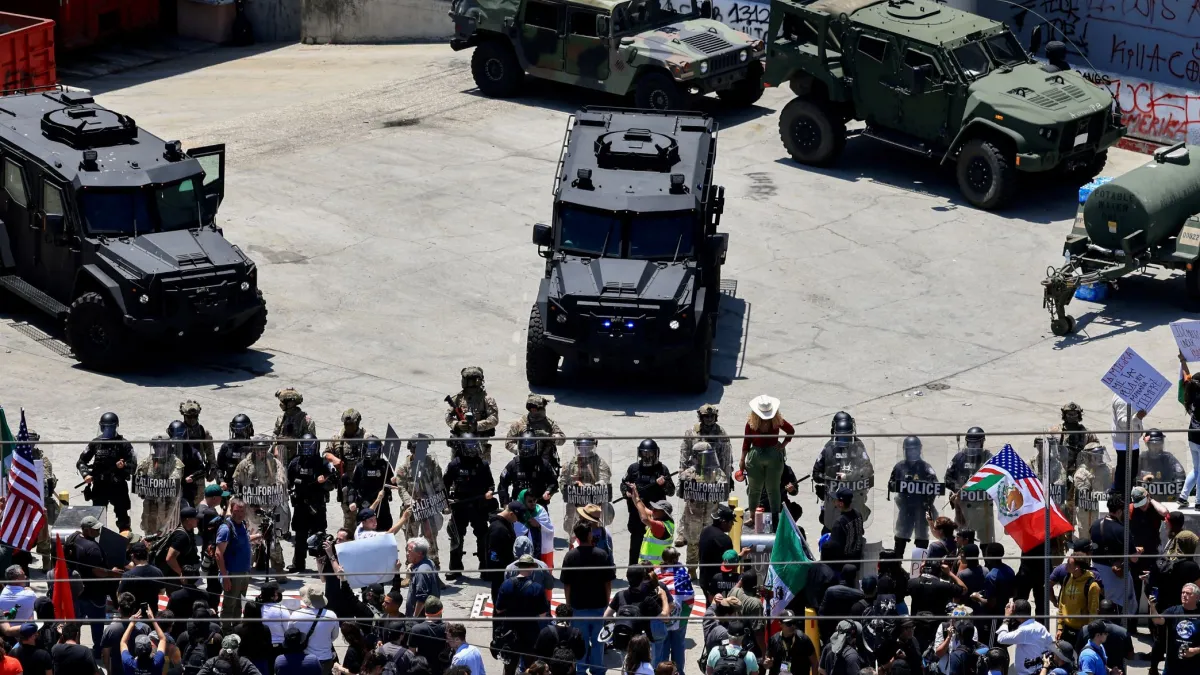
President Donald Trump has touched off a furious backlash and partisan debate by ordering the deployment of more than 4,000 National Guard troops and 700 Marines to Los Angeles in response to protests that began Friday against federal immigration raids and stepped-up deportations.
That response is estimated to cost $134 million and last for 60 days, a Pentagon official told lawmakers on Tuesday.
Raising serious concerns: In moments of crisis, financial and fiscal concerns obviously are secondary. In this case they trail far behind fears and concerns raised by the idea of a federal military response in the streets of a major American city — one that runs counter to the wishes of state and local officials who said they were well-equipped to handle the protests. Democrats have blasted Trump’s move as escalatory, and California sued Trump on Monday, saying that the president had unlawfully bypassed Gov. Gavin Newsom in an “unprecedented power grab.” It marks the first time in 60 years that a president has bypassed a state governor to deploy National Guard troops — and when President Lyndon B. Johnson did it in 1965, it was to protect civil rights demonstrators marching in Alabama.
Trump’s orders have prompted widespread warnings about executive overreach, with critics charging that the president created a crisis to enable an authoritarian show of force, or that his move was a political stunt meant take advantage of a favorable issue, immigration, and use it to rally supporters, attack opponents and distract from other topics. The Washington Post notes that Trump has declared eight separate emergencies since taking office, far more than other recent presidents, with some of his declarations pertaining to matters where “emergencies were hard to discern.”
“I can’t get into the head of the president, but this is something a dictator would do,” Rep. Zoe Lofgren told the Post. “If people aren’t concerned about it, they could watch our country’s liberties drip away.” (The White House argues that Trump is properly using his executive authority and taking necessary action where Democrats have failed to do so.)
Hegseth faces lawmakers: Questions of cost pale in comparison to such fundamental issues — and yet, they aren’t entirely irrelevant. At a combative Tuesday hearing of the House Appropriations Subcommittee on Defense, Democrats pressed Defense Secretary Pete Hegseth and acting Pentagon Comptroller Bryn Woollacott MacDonnell on why the troop deployments were necessary and where the money will come from.
“We have the funding to cover down on contingencies, especially ones as important as maintaining law and order in a major American city,” Hegseth said. He also defended the deployment, arguing that it was needed to protect immigration agents in their operations — and he opened the door to other domestic deployments. “I think we’re entering another phase, especially under President Trump with his focus on the homeland, where the National Guard and Reserves become a critical component of how we secure that homeland,” Hegseth said at one point.
MacDonnell said that the funding will come from the Defense Department’s operations and maintenance accounts and the estimate includes food, transportation, housing and other costs.
Democrats complain about lack of Trump budget details: Democratic appropriators also expressed frustration that the administration has yet to deliver a complete defense budget request for fiscal year 2026 and complained that the administration is relying on a “risky” reconciliation process and not just on regular appropriations.
“We are in mid-June, Mr. Secretary. We are marking up a defense funding bill in a few hours, and yet we have no idea what your department actually needs,” said Rep. Rosa DeLauro of Connecticut, the top Democratic appropriator in the House. She later asked specifically about investments in submarine programs and pressed for information about broader plans for the future. “We don't have anything today. We have zip, nada in knowing where you're going,” she said. “Give us the details.”
Hegseth said the details would be provided. He still faces two other congressional hearings this week.
Record funding levels: The House Appropriations Defense Subcommittee later advanced the Republican Defense appropriations bill that would provide $831.5 billion in funding for next year, the same base level enacted for fiscal 2025. Combined with defense funding Republicans hope to provide through the reconciliation process, total defense spending for fiscal year 2026 would top $1 trillion.